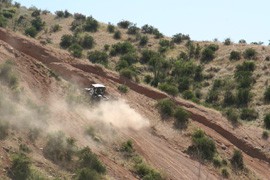Cronkite News has moved to a new home at cronkitenews.azpbs.org. Use this site to search archives from 2011 to May 2015. You can search the new site for current stories.
After sharp rise in OHV fatalities, official calls for safety education
PHOENIX – A sharp increase in fatal off-highway vehicle accidents in 2011 has a state official urging riders to take hands-on safety courses and learn the rules.
Those steps are especially important heading into fall, when riders take advantage of cooler temperatures and hunting seasons kick off, said Reuben Gonzalez, a public information officer and law enforcement specialist with the Arizona Game and Fish Department.
“We’re trying to get the public to understand that with the increased number of riders there is also an increased number of inexperienced riders and those are the ones that are probably getting injured and in some cases killed,” he said.
Arizona had 29 OHV-riding fatalities in 2011, up from eight in 2010, according to Arizona Department of Health Services statistics. OHV accidents also resulted in 1,611 emergency room visits and 409 hospitalizations in 2011.
Gonzalez said officials found that the majority of those involved in OHV accidents were under 18, weren’t wearing helmets or other proper equipment or had little to no experience.
“It’s like a 15-year-old getting behind the wheel of a car,” Gonzalez said. “Without proper training, something bad is bound to happen.”
Game and Fish offers an online OHV safety certification course for $29.50 and, through its website, offers a directory of hands-on safety courses around the state.
Thomas Sanio, an instructor with the ATV Safety Institute, which offers hands-on training, said too often young people are allowed to ride without supervision or an understanding of how to ride safely.
“You put a rider who is too young or not mature enough on a machine that’s not set up for them, it’s a recipe for disaster,” he said.
Marge Dwyer, who administers Arizona State Parks’ OHV Ambassadors program, said a lot of people consider riding OHVs “just a sport” and fail to learn rules, regulations and safe-riding techniques.
“People forget that these vehicles are not enclosed,” she said. “They don’t understand the tipping ratio and put as many people on one vehicle as they possibly can.”
OHV Ambassadors take the instruction out to riders, monitoring public lands in groups of two or more and educating OHV users as appropriate.
Arizona doesn’t require OHV operators to take a safety education class, but Gonzalez said he’d like to see that change.
“Having someone, especially someone under the age of 18, go through a course like this would better prepare them,” he said.







